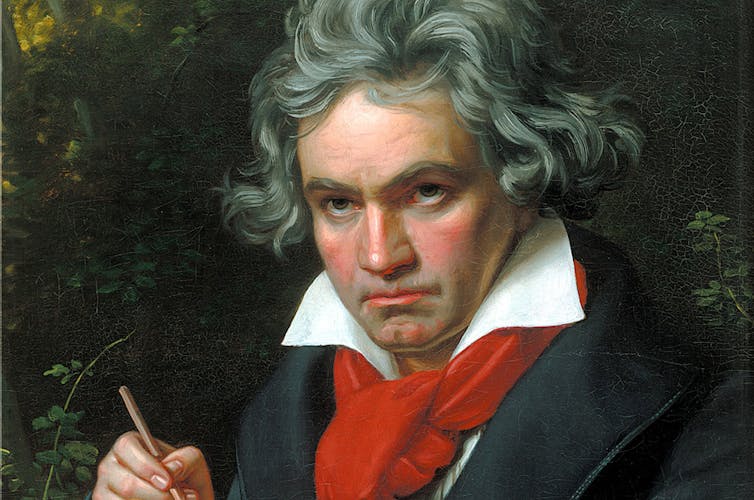BOOK REVIEW: Da-da-da-DUMB
Beethoven’s Fifth Symphony is one of the most arresting of the Romantic period creations but this has not prevented commentators from writing “roaring cataracts of nonsense” about it. Those choice words from the late English critic and musicologist Donald Tovey came to mind as I picked up Matthew Guerrieri’s new book “The First Four Notes: Beethoven’s Fifth and the Human Imagination” (Alfred A. Knopf, 359 pages, $26.95).
Intriguingly-titled, yes, but a fair question arises: Is this book more roaring nonsense?
The first four notes of the symphony, da-da-da-DUM, certainly make an impression, as Guerrieri details in 50 rather wordy pages the abuses and allusions this musical figure has suffered outside the concert hall. Some are memorable, some are dubious. For example, I have trouble hearing Beethoven’s quartus paeon (three shorts and a long) in Martin Luther King’s “I have a DREAM”. The rhythm is all wrong.
The problem with this book is that halfway into it the reader is still unsure what it is about. It is certainly not about Beethoven, nor did I see much imagination in it. Frequent tangents take the reader far into the clouds. Do we need to be reminded that Sir Thomas Beecham’s grandfather used to make laxative pills? I had to plow, and finally scan, to get to the end. Might it end up like a Stephen Hawking book, acquired by many, read by few?
In a nutshell, Guerrieri is addressing the Fifth’s relationship with the 19th century German philosophers, a well-trodden path for specialists but bordering on the arcane for everyone else. Fate, destiny and possible meanings of the four notes are examined in detail. Every Beethoven reference in Hegel is exploited to some cosmic purpose. Abstract chapter headings don’t help – Fates, Infinities, Earthquakes.
As Christopher Hitchens once said about Jean-Paul Sartre, I was soon fed up with the “panoptic bloviations”.
The fundamental problem is that the first four notes remain an enigma, and therefore a difficult idea difficult to shape into a book-length discussion. He uses words such as “perhaps”, “maybe” and “I wonder” to protect himself. Guerrieri discusses Charles Ives’ Concord sonata which he says collects “every varying interpretation” of the four notes, “profound and trivial, sacred and profane, feral and tame, indefinite and infinite”. I am confused.
Indeed, the four notes prove too narrow a subject, and so Guerrieri’s story widens to include the impact of the entire symphony. Marx, Engels, Kautsky, Kant, Swedenborg, Nietzsche, E.M. Forster, E.T.A. Hoffman and Isaiah Berlin weigh in. By the middle of this survey we are exhausted rather than enlightened.
The text remains turgid despite Guerrieri’s occasional stabs at lively prose, but most of these efforts misfire. He writes: “Hegel’s discussion of Essence is one of those places where he really earns his reputation for obscurity. When Hegel warns the ‘The theory of Essence is the most difficult branch of Logic”, it’s kind of like hearing Evel Knievel say that a ride is about to get particularly bumpy.”
I turned the page when I read: “Beethoven’s music is a lot like Steve McQueen’s acting … physically dynamic, emotionally inscrutable, stoically cool.”
Guerrieri is a critic for the Boston Globe but wants us to believe in his scholarly credentials. To wit, he bolsters his text with 466 bibliographical references and 35 pages of notes, some untranslated from the German and French. Was this a mind dump or was Google behind this research?
Reaching into his newspaper vocabulary, he boosts his prose with dissonant jargon such as mission creep, from the get-go, a line in the sand, cherry-picking and chin-scratchers (philosophers). He was a bit off key with “groovy”, which went out with the Beat Generation.
Hidden amid the bloviations are some lucid passages, too. He showed promise with his explanation of the Romantics vs. the giants of the Enlightenment. “The Romantics were dedicated to bringing back into art the inexplicably sublime, which they thought had been bled out by the Enlightenment’s excessive rationality… (They) drafted the most singular and dynamic thing around – Beethoven’s Fifth.”
To me his best passage is saved for the epilogue, a five-page description of the disastrous first performance of the Fifth in 1808, described by Johann Friedrich Reichardt as a “large, very elaborate too long symphony”. During rehearsals, Beethoven “pounded with such ferocity that he knocked the candles from the piano”, Reichardt wrote. The players refused to continue unless Beethoven was banished from the hall. When questions arose, concertmasters carried hand-written notes to him outside for clarification.
Guerrieri is effusive in his acknowledgements to people who helped. Among them him was The New Yorker’s Alex Ross, a fine music writer in his own right. Ross not only “vouched for the author”, he reviewed drafts of the book. In return Ross raises the effusion stakes by providing a back cover blurb praising Guerrieri as “brilliant, impassioned and witty”. And then we go right over the top: “A bit like Beethoven himself, Guerrieri finds a cosmos in four notes.”
Well, a blurb is only a blurb.
This article is brought to you by the author who owns the copyright to the text.
Should you want to support the author’s creative work you can use the PayPal “Donate” button below.
Your donation is a transaction between you and the author. The proceeds go directly to the author’s PayPal account in full less PayPal’s commission.
Facts & Arts neither receives information about you, nor of your donation, nor does Facts & Arts receive a commission.
Facts & Arts does not pay the author, nor takes paid by the author, for the posting of the author's material on Facts & Arts. Facts & Arts finances its operations by selling advertising space.




















